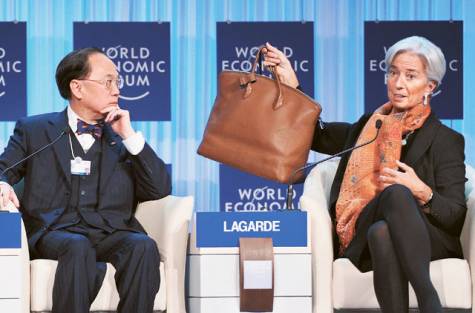
本届世界经济论坛(WEF)的“全球经济展望”讨论,议题是世界经济面临的各项挑战,由英国《金融时报》首席经济评论员马丁•沃尔夫(Martin Wolf)主持。参与讨论的嘉宾阵容十分庞大,大到无法展开深入探讨。他们包括国际货币基金组织(IMF)、世界银行(World Bank)和金融稳定委员会(FSB)的负责人,但有趣的是,没有一个人代表欧元区国家。相比达沃斯论坛上普遍越来越乐观的情绪,这场讨论则要冷静得多。
在这场讨论上,三个观点比较突出。
1. 人们普遍认同,欧洲央行(ECB)为银行提供无限量长期贷款的行动,为欧元区解决其危机赢得了大量时间。金融稳定委员会主席、加拿大央行(Bank of Canada)行长马克•卡尼(Mark Carney)提出了一个大胆预测,即他认为发生大灾难的风险已经过去了。“(如今)欧洲不太可能发生雷曼式的灾难。这一点很重要。”其他嘉宾也都持类似观点。
2. 非欧元区代表明确表示,欧元区必须首先采取更多举措,建立一道有效的防火墙,阻断危机蔓延,只有欧元区这样做了之后,其它国家才有可能考虑向IMF提供更多资源,或付出其它努力以表现更大范围的世界团结。英国财政大臣乔治•奥斯本(George Osborne)再次表示要“先看看它们钱的颜色”;IMF总裁克里斯蒂娜•拉加德(Christine Lagarde)戏剧性地举起她的手袋,向在座嘉宾为IMF筹资,但也认同欧元区必须先做更多。发展中国家代表的建议则要直接得多。他们指出,当年他们国家发生危机的时候,政府采取了一些艰难措施,欧元区也不应例外。
3. 危机尚未结束,尽管达沃斯和金融市场上的情绪已变得更加乐观。香港特首曾荫权(Donald Tsang)最好地表达了这一点。他对在场听众表示,香港预算平衡,储备相当于两年的公共支出,就业充分,增长非常快。“看起来一切都非常健康,“他说,又补充道:“但我从未像现在这样恐惧。”他的意思是,在这个彼此紧密相连的世界,他不敢保证,欧洲如果崩盘,不会严重到把像香港这样看似稳健的经济体也拖入无底深渊。
达沃斯上的乐观情绪看似诱人,但全球经济仍困难重重的现实还是挥之不去。
译者/何黎
http://www.ftchinese.com/story/001042860

At the global economy session at the World Economic Forum, chaired by the FT's chief economic commentator Martin Wolf, a very large panel – too large for a proper discussion – discussed the challenges facing the global economy. Including the heads of the International Monetary Fund, the World Bank, the Financial Stability Board, but interestingly no-one representing a eurozone country, the debate was more sober than the general mood in Davos of increasing optimism.
Three things stood out.
1. There was general agreement that the European Central Bank’s actions to provide unlimited long-term funding for banks has bought a significant amount of time for the eurozone to sort out its crisis. Mark Carney, head of the FSB and governor of the Bank of Canada, made a bold prediction now he thought the risks of a catastrophe had passed. “There is not [now] going to be a Lehman-style event in Europe. That matters”. Similar sentiments were shared among the panel.
2. Non-eurozone representatives are clear the eurozone must do more to build a deployable firewall to prevent contagion before they will consider additional resources to the IMF or other efforts to express wider global solidarity. George Osborne, UK chancellor, made the point again about wanting to “see the colour of their money”; Christine Lagarde, although dramatically holding up her hand bag to raise money for the Fund, also accepted that more needs to be done. Developing country representatives had rather more direct recommendations, pointing out that they had to impose difficult policies when they had a crisis and the eurozone should be no different.
3. The crisis is not over, despite a more positive mood in Davos and in financial markets. Donald Tsang, the chief executive of Hong Kong, put it best. He told the audience that Hong Kong had a balanced budget, reserves equivalent to two years of public expenditure, full employment and very rapid growth. “It all looks very nice,” he said, adding, “I have never been as scared as now”. His point was that in an inter-connected world, he could not be sure that a blow-up in Europe would not be so serious that it could put even a seemingly-resilient economy such as Hong Kong into a very deep hole.
The optimistic mood in Davos can be seductive, but the nastier reality of the still-troubled global economy has made its presence felt.
没有评论:
发表评论